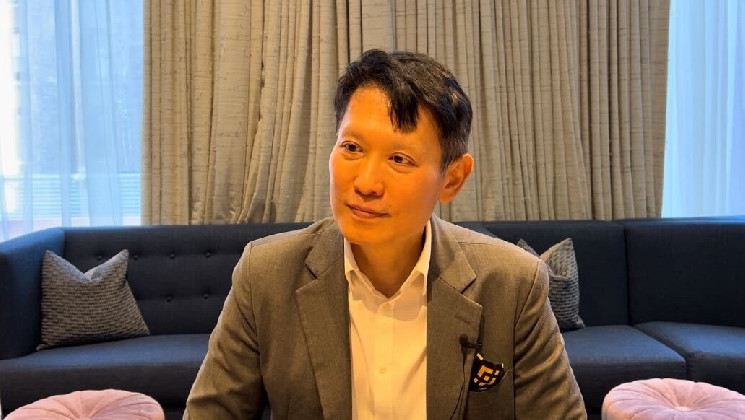NEW YORK — Richard Teng ascended to the top of cryptocurrency behemoth Binance last year via less-than-ideal circumstances as his predecessor, Changpeng "CZ" Zhao, was forced to quit the exchange as part of a multi-billion-dollar settlement with the U.S. government.
But on the plus side, he inherited a CEO job at a profitable cornerstone of the crypto industry – albeit one he aims to grow and mature.
In the nine months since he's taken the helm, Teng – a former regulator in both his native Singapore and the United Arab Emirates – has focused on transforming Binance from a founder-led organization, as it was during CZ's tenure as CEO, to one steered by a board of directors. And, while the company kept mum on where exactly it was headquartered – at least once vaguely insisting that it's an "international company," and always denying that it was a Chinese company – Teng is on the hunt for a place for Binance to permanently call home.
The enormous surge in crypto prices since Binance rival FTX's collapse in late 2022, coupled with traditional financial institutions' embrace of (or incursion into, depending on one's perspective) the space and hopes that U.S. regulators might soften their stance on crypto, has led to speculation about a looming wave of initial public offerings.
But, in a wide-ranging interview with CoinDesk journalists in New York on Wednesday, Teng said his seven-year-old company isn't considering one.
"We are in very strong financial shape, so there's really no need for us to consider any fundraising or an IPO at this time," Teng said. "Since the fifth month of Binance's operation, it has been profitable, and it has been very prudent in terms of spending. So [an IPO] is not a subject that has come up."
The exchange's efforts to become more transparent – including spending 36% more on compliance efforts last year versus 2022 and its ongoing search for a place to put down roots – are, Teng says, about having better relationships with global regulators and, thus, steering the company in more future-proofed direction.
"It's really about building a sustainable enterprise that will not only succeed over the next few years, but continue to prosper for the next 50 to 100 years," Teng said. "That's certainly our aspiration."
CZ's involvement
Teng was appointed CEO by CZ, who stepped down as Binance CEO as part of the company's $4.3 billion settlement with U.S. regulators for violating sanctions and anti-money laundering (AML) laws. CZ also pleaded guilty to failing to maintain an appropriate AML and know-your-customer (KYC) regime and was sentenced to four months in federal prison in June.
But CZ, who had been the very public face of Binance, is no longer part of the company's day-to-day operations or decision-making. (He began a four-month prison sentence in June.)
"As part of the U.S. resolution, CZ is not able to be involved in the operations of the company," Teng said. "I don't speak to him."
However, Teng said that Binance co-founder Ye Hi – CZ's partner and the mother of his three youngest children – is still a "critical part" of the crypto exchange's management team.
"Ye is involved in various aspects of the business," Teng said, adding that she oversees Binance's human resources department and likes to joke that she is the exchange's chief customer service officer. "She's a highly talented, highly independent-minded person."
Global ambitions
When asked whether Binance had considered raising money to potentially dilute CZ's ownership of the company, Teng demurred, saying that such questions were for the exchange's shareholders and board of directors to decide.
But Teng said that CZ's status as a felon has presented less of a challenge to getting regulated than outside observers might think.
"We do work closely with global regulators. In many places around the world, it's not a problem. There could be areas where it may be a challenge, but we have already resolved some of those issues," Teng said, referring to the licenses the company has recently received and settlements it has made in countries like Dubai, India, Thailand and Brazil.
Teng stressed the importance of Binance clearing the slate with global regulators, atoning for its past missteps and moving forward with its business in a more transparent, regulated manner.
"We acknowledge our past mistakes. We have paid a heavy penalty on that front," Teng said. "Going forward, we are looking at how we continue to build a sustainable, robust platform working with global regulators."
No interest in the U.S.
One country Binance is not currently interested in expanding into is the U.S., which levied that massive penalty on the exchange late last year.
"At this point in time, what we're really focusing on is markets outside of the U.S.," Teng said.
And while many in the crypto industry are eagerly anticipating the outcome of the upcoming U.S. presidential election, hopeful that a Donald Trump victory could pave the way for a clearer – and friendlier – regulatory regime for crypto, Teng said the election results mean little to Binance either way.
"Our business is outside of the U.S.," Teng said. "So we watch with excitement what's happening in the U.S., but it has no bearing on our business whatsoever."
Kevin Reynolds, Ben Schiller, Margaux Nijkerk, Jennifer Sanasie and Mel Montanez contributed reporting to this story.
 coindesk.com
coindesk.com
